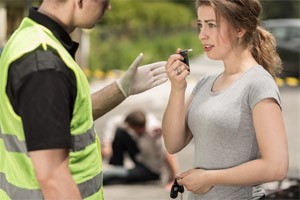
In New Jersey, if you are pulled over and the officer suspects you were driving drunk, he or she may use a breathalyzer test to measure your blood alcohol content (BAC), which can be used as evidence against you if you are later charged for DUI/DWI. Police stations across the state use a machine called the Alcotest 7110 MK-IIIC to measure your BAC and determine whether or not you are at or over the legal limit of .08%.
Importantly, many drivers do not know that if you submit to a breathalyzer test, you also have the right to an independent test of your urine, blood, or breath sample. If your BAC results are close to .08%, an independent test can show that the breathalyzer results were inaccurate and you were actually below the legal limit for drunk driving. Similarly, the law requires that you be informed of your right to an independent chemical test, and, if you can prove that the government failed to inform you of this right, you may be able to have the breathalyzer evidence thrown out.
As always, challenging the evidence against you in a DUI/DWI trial can be very complicated, and it is important to retain an experienced drunk driving lawyer if you or a loved one is charged with driving under the influence of alcohol or drugs, in order to ensure that the best defense is presented on your behalf.
Your Legal Right to an Independent Breath, Blood, or Urine Test
N.J.S.A. 39:4–50.2 establishes that drunk driving is a quasi-crime, and a driver who is suspected of drunk driving does not have a right to refuse to provide a breath sample (as discussed previously in this blog). At the same time, if a police officer decides a driver must provide a breath sample for the purposes of determining BAC, N.J.S.A. 39:4–50.2 also provides the same driver with the right to have a person or physician of the driver’s own choosing perform an independent breath, urine, and blood test. This protects the driver’s rights and helps to ensure that any BAC test performed by the police is accurate.
Learning About Your Right to an Independent Test
New Jersey law actually states that a defendant must be informed of his or her right to an independent test by the police officer who orders the breath test. Of course, this is limited to situations in which the individual is required to provide a breath sample, and there is no equivalent requirement in the event that BAC is calculated based on a blood sample.
In practice, police officers in most police stations will read a series of pre-printed paragraphs to any driver who is being asked to provide a breath sample. These paragraphs generally include a statement – referred to in many places as “paragraph 36” – that attempts to inform the driver of his or her right to obtain an independent test. The courts have considered this to be sufficient notice under the law.
If no notice is provided to a driver when he or she is asked to provide a breath sample, then an experienced attorney may be able to keep out any BAC evidence obtained by the police officers at the time of trial.
Having an Independent BAC Test Performed
The law does not require a police officer or a police station to have any established procedures to help a driver obtain an independent chemical test – however, the law is clear that police may not interfere with or thwart a suspect drunk driver’s attempt to exercise the right to independent examination.
Therefore, a driver is largely on his or her own with regard to obtain an independent chemical test. He or she may do this by contacting an attorney or family member who can help get an independent test done. In State v. Jalkiewicz, the court ruled that the police fulfilled its duty when it advised the defendant of his right to an independent test and then summoned a taxi cab for the driver.
At the same time, in State v. Bradley and State v. Nicastro, the court ruled that the government actively prevented suspected drunk drivers from exercising their rights to an independent BAC test when the police refused the drivers’ request to be taken to the hospital for an independent test and also refused the drivers’ request to call a taxi to take them to the hospital. In both of these cases, the court determined that the BAC test results taken by the police could not be used in court.
Finally, in State v. Greeley, the Supreme Court determined that if the police refuse a suspected drunk driver’s request for a taxi, there must be some means for the person to obtain an independent chemical test, such as being released into the custody of a family member or friend.
As in Bradley and Nicastro, it is extremely important that you contact an experienced attorney whenever you are charged or suspected of a DUI or DWI. An attorney can help provide the best defense in your case and ensure that your rights have not be violated.
New Jersey DUI/DWI Attorney Edward M. Janzekovich Will Fight for Your Rights
If you or someone you know is charged or suspected of driving under the influence of alcohol or drugs, it is extremely important to contact an experienced DUI/DWI attorney who can explain what rights you have in your specific situation. If you go to court, an experienced lawyer can also make sure you get the best result possible and can make all the difference. To speak with an experienced New Jersey DWI/DUI lawyer bout your situation, call us at 732-257-1137 contact us online today. We serve clients throughout the state of New Jersey.










